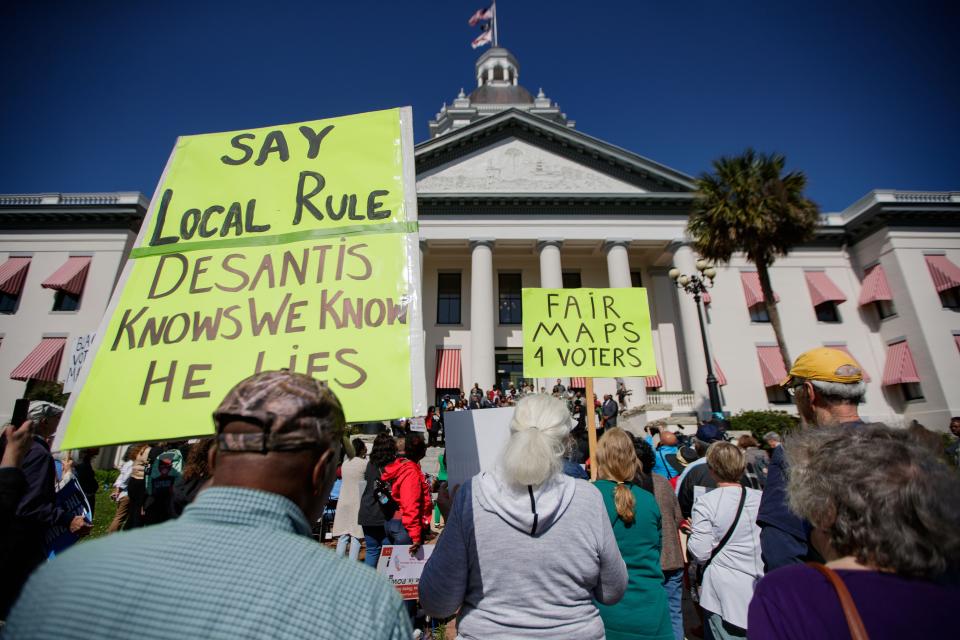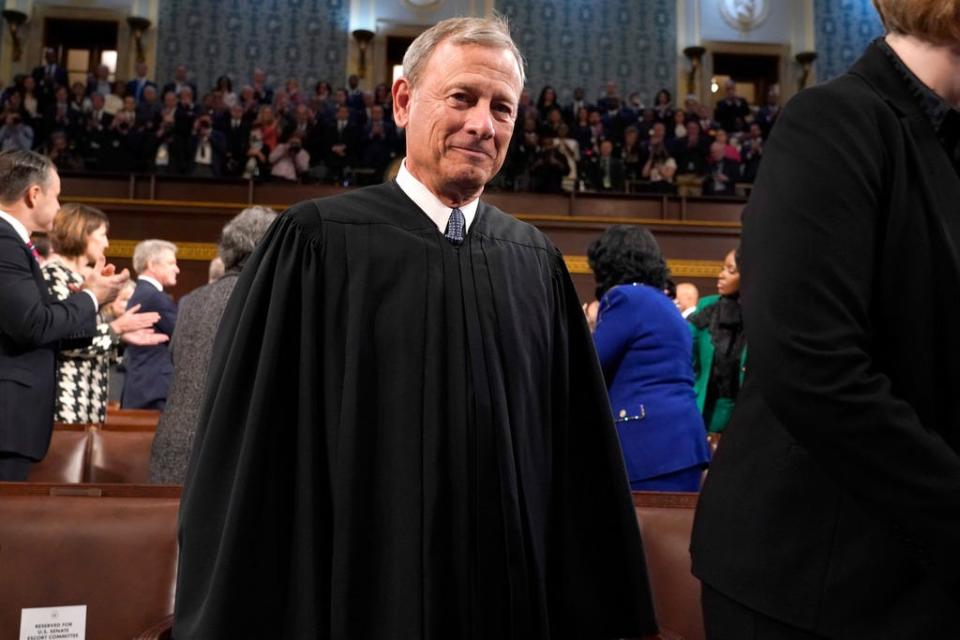Alabama redistricting ruling 'opens the window to hope' for Florida challengers
- Oops!Something went wrong.Please try again later.
TALLAHASSEE – The U.S. Supreme Court’s unexpected ruling in favor of Black voters in an Alabama congressional redistricting fight was hailed by groups engaged in similar court battles in Florida.
The 5-4 decision Thursday by justices affirmed a lower court ruling that found the federal Voting Rights Act was likely violated by an Alabama congressional map, which diluted Black voting strength by having only a single district with a majority Black population.
More than one in four Alabama residents are Black.
In Florida, state and federal lawsuits are challenging the new congressional district plan pushed by Gov. Ron DeSantis that eliminated a North Florida district represented since 2017 by U.S. Rep. Al Lawson, a Black Democrat.
More than 370,000 Black voters from Gadsden County to Jacksonville who had been in Lawson’s district were scattered across four newly crafted districts, all won by Republican members of Congress in 2022.
None of these four districts have large Black voting populations.
“We’re very hopeful that what came out in Alabama will bode well for Florida,” said Kathay Feng, vice president of programs for Common Cause, which is among the plaintiffs suing Florida in federal court over the congressional map.
Feng said justices clearly signaled that the “Voting Rights Act is not dead.”

Recent headlines: DeSantis and GOP Legislature win key round in redistricting fight
“Protections against racial gerrymandering are not dead and if the historical record and the facts show themselves to be worthy, the Supreme Court will find there is racial gerrymandering and will order” a remaking of the map, she added.
DeSantis map helped Florida Republicans make historic gains
The DeSantis-backed map helped Florida Republicans win four additional seats in last November’s election, the biggest pickup of any state as the GOP regained control of the U.S. House.
Florida has 20 Republican members of Congress and eight Democrats.
“I’m breathing a sigh of relief that the Voting Rights Act as we know it lives to see another day and that the Supreme Court... has rejected the attempt to limit the VRA in the kinds of ways that Gov. DeSantis would have liked,” said David Grimes, staff director of the Florida state House Democrats and the caucus’ chief redistricting advisor.
The ruling by the justices comes three days after DeSantis and the Republican-controlled Legislature won a round in state court when Leon County J. Lee Marsh ruled that lawmakers could argue in defense of the map that the Florida Constitution’s Fair Districts standards violate the U.S. Constitution equal protection requirements.
The Florida League of Women Voters and a coalition of Black voting groups contend the congressional map should be overturned because the state’s voter-approved Fair Districts prohibit creating political boundaries that diminish the ability of minorities to elect candidates of their choice.
A state trial is scheduled for August. The federal trial involving Common Cause and others is set for September and accuses the governor and Legislature of intentionally discriminating against Black voters in violation of the U.S. Constitution.
Federal court challenge may be most affected by SCOTUS ruling
The federal challenge could be most directly affected by Thursday’s ruling, experts said.
For his part, DeSantis has argued that the U.S. Supreme Court in a 2017 North Carolina case found it unconstitutional to racially gerrymander a seat except in narrow instances that he contends, Lawson’s old district failed to meet in spanning Jacksonville to the Tallahassee-area.
Ugly ending of redistricting session: Amid shouts of 'stop the Black attack', Florida lawmakers pass DeSantis congressional redistricting map
Another Orlando-area district now held by U.S. Rep. Maxwell Frost, D-Orlando, also lost a significant share of its Black voting population under the new congressional plan.
Chief Justice John Roberts wrote Thursday’s majority opinion and addressed some of the racial interplay in the decision.
Roberts wrote that there remain legitimate concerns that the Voting Rights Act “may impermissibly elevate race in the allocation of political power within the states.”
But he added, “Our opinion today does not diminish or disregard these concerns. It simply holds that a faithful application of our precedents and a fair reading of the record before us do not bear them out here.”
Roberts was joined in the majority by Justice Brett Kavanaugh and the court’s three liberal members, Justices Sonia Sotomayor, Elena Kagan and Ketanji Brown Jackson.
Justices have eroded Voting Rights protections in past rulings
Roberts was part of conservative majorities that in 2013 and 2021 made it more difficult for racial minorities to use the landmark Voting Rights Act. Many court-watchers were surprised by Thursday’s decision.
The court’s other four conservatives dissented, with Justice Clarence Thomas writing the ruling forces, “Alabama to intentionally redraw its longstanding congressional districts so that Black voters can control a number of seats roughly proportional to the Black share of the state’s population. Section 2 (of the VRA) demands no such thing, and if it did, the Constitution would not permit it.”

The Alabama case includes strong parallels to Florida’s, those involved say. Both deal with communities of Black voters whose political power has been suppressed by state and federal laws going back generations.
While the lawsuit challenging the Florida congressional map in state court largely pivots on the Fair Districts requirements, the federal lawsuit centers around the state’s racial history and how the new congressional boundaries hurt Black voting strength.
Florida elected its first three Black members to Congress only 30 years ago for the first time since shortly after the Civil War. DeSantis’ approach has been condemned by Black leaders as designed to turn back the political clock.
“I think it’s very encouraging the Supreme Court has made this decision,” said Rep. Kelly Skidmore, D-Boca Raton. “It really opens the window to hope.”
John Kennedy is a reporter in the USA TODAY Network’s Florida Capital Bureau. He can be reached at jkennedy2@gannett.com, or on Twitter at @JKennedyReport
This article originally appeared on Tallahassee Democrat: How Supreme Court redistricting ruling could impact Florida cases
